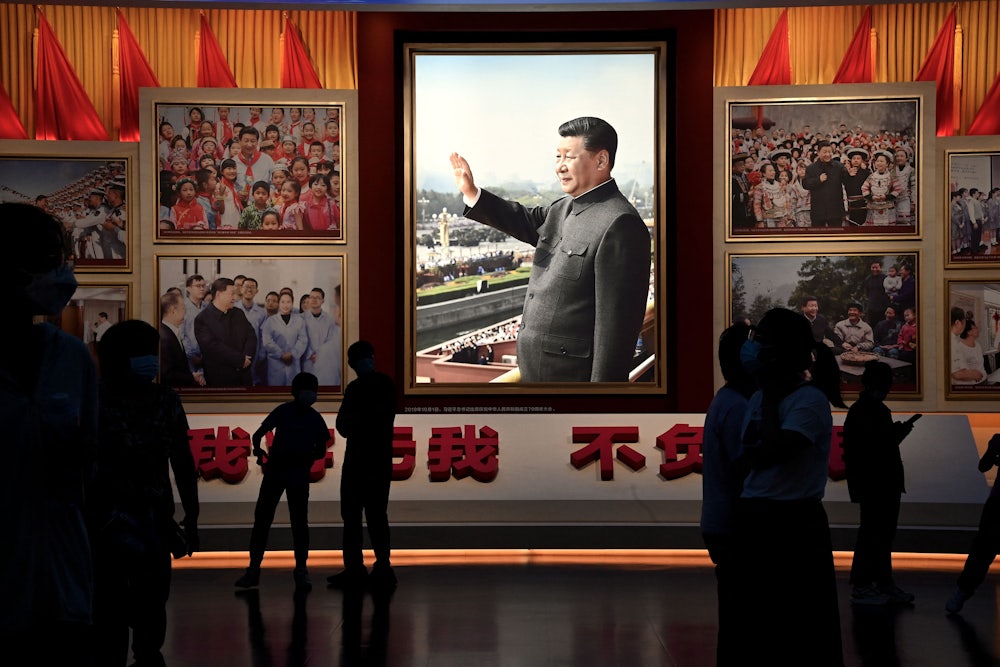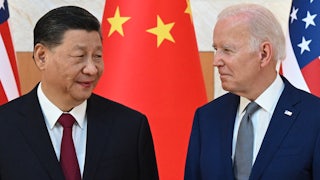Here are some recent headlines from U.S. newspapers concerning developments in Xi Jinping’s China, putatively America’s foremost adversary on the world stage: “STIFLED BY XI, DISSENT ROARS BACK TO LIFE”; “ANTI-LOCKDOWN PROTESTS CALL FOR XI TO RESIGN”; “XI JINPING APPROACHES MULTIPLE POINTS OF NO RETURN”; “A WITNESS TO MAO SEES WORRYING SIMILARITIES IN THE ERA OF XI”; “XI’S CHALLENGE: HOW TO MOURN PREDECESSOR”; “BEIJING’S BARGAIN WITH ITS PEOPLE IS SHAKEN..”
It is a common saying in China that Mao Zedong made the country free, and Deng Xiaoping made it rich. Mao’s communist revolution did set China free from the stranglehold on its economy exercised by Western powers since the mid–nineteenth century, but his cruel experiments in economic development resulted in mass famines on a colossal scale. It was indeed his successor, Deng, who set China on a course of economic modernization that brought remarkable prosperity to the country, especially in the urban areas, in little more than two decades. Deng accomplished this by opening China to foreign trade and investment and making it an integral part of the globalization process then underway, asserting that no country in the world had been able to modernize successfully without doing so. His successor, Jiang Zemin, continued Deng’s approach, which happens to be what provoked the headline concerning Xi’s difficulty in mourning him—because Xi, after he took office, had soon undertaken to curtail Jiang’s and Deng’s open-door policy.
The charming term CHINAMERICA was now a thing of the past. But what did the future hold, observers now wondered—especially when it began to appear that anti-democratic sentiment was sweeping the globe, reaching even into the hinterlands of the United States? Aligned with that question was a further concern: Were China, as a rising, increasingly bellicose power, and the United States, a supposedly declining one, bound eventually to clash, possibly in nuclear warfare?
This concern was connected to a 2017 book entitled Destined for War: Can America and China Escape Thucydides’s Trap?, by Graham Allison. Allison derived his question from Thucydides’s History of the Peloponnesian War, which chronicled the downfall of Athens at the hands of Sparta. “When a rising power threatens to displace a ruling power,” Allison wrote, “the resulting structural stress makes a violent clash the rule not the exception.” A few years later, Allison’s theory was modified by Edmund Stewart, a professor of ancient Greek history at the University of Nottingham, in an article in the journal Antigone. Stewart questioned Thucydides’s notion that Athens was a rising power challenging the dominance of Sparta, and contended rather that differences in constitutional arrangements and political values—such as those between a democracy (Athens) and an oligarchy (Sparta)—are likely to lead to dangerous friction between national entities. This, obviously, could apply equally for the United States and China.
There has been a great deal of focus in recent years on China’s coming decline. One notable such effort, “THE END OF CHINA’S RISE” by Michael Beckley and Hal Brands, appeared in Foreign Affairs magazine in October 2021. Beckley and Brands argue that the phenomenal economic success China enjoyed for several decades was a “historical anomaly” resulting from several factors that are no longer existent. The first was the close and mutually advantageous economic relationship that developed between the United States and China after President Nixon’s visit there in 1972. The second was the economic and political reforms set in motion by Deng. The third was the dramatic rise in population growth that began after the end of the civil war between the communists and nationalists in 1949. But in more recent times, Beckley and Brands explain, China has experienced a reversal of fortune in all these areas. China is running out of water—half of its rivers have vanished, and 60 percent of its groundwater is undrinkable. It has destroyed 40 percent of its farmland through overexploitation.
Food insecurity is widespread. Despite its prodigious domestic production, China has been a net importer of agricultural products for nearly two decades. Most deleteriously, China’s population is shrinking, a consequence of the one-child policy adopted by the government in 1980. Between 2020 and 2035, Beckley and Brands estimate, China will lose 70 million working-age adults and gain 130 million senior citizens—a problem that will get worse through 2050. Age-related spending will have to triple by that year, reaching 30 percent of GDP (as a point of comparison, all of China’s government spending today comes to roughly that amount). Finally, Beckley and Brands inform us that most recent growth in China—since the financial crisis of 2008—has resulted from the government “force-feeding” capital into the economy, which the academic Daniel Lynch, in his version of “THE END OF CHINA’S RISE,” calls “the greatest monetary stimulus program the world has ever seen.”
How will China’s demographic and economic deterioration affect its behavior on the world stage? As Europe discovered in 1914, it is impossible to predict the future course of international events. Anne Applebaum wrote a piece for The Atlantic, “THE BAD GUYS ARE WINNING,” in which she portrays a coalition of anti-democratic states, led by Russia and China, determined to challenge the democratic order around the globe. It is particularly worrisome that Xi has emerged as a Mao-like tyrant, complete with books on “Xi Jinping Thought.” The deterioration of China’s economic status might make it more likely, rather than less, that Xi will take unwise actions. However, the United States has at the ready a number of allies in the Indo-Pacific—including Japan, Australia, India, and the Philippines—prepared to participate in countering Chinese belligerence. The future, an ancient sage might venture, is wide open to the vagaries of fate.






